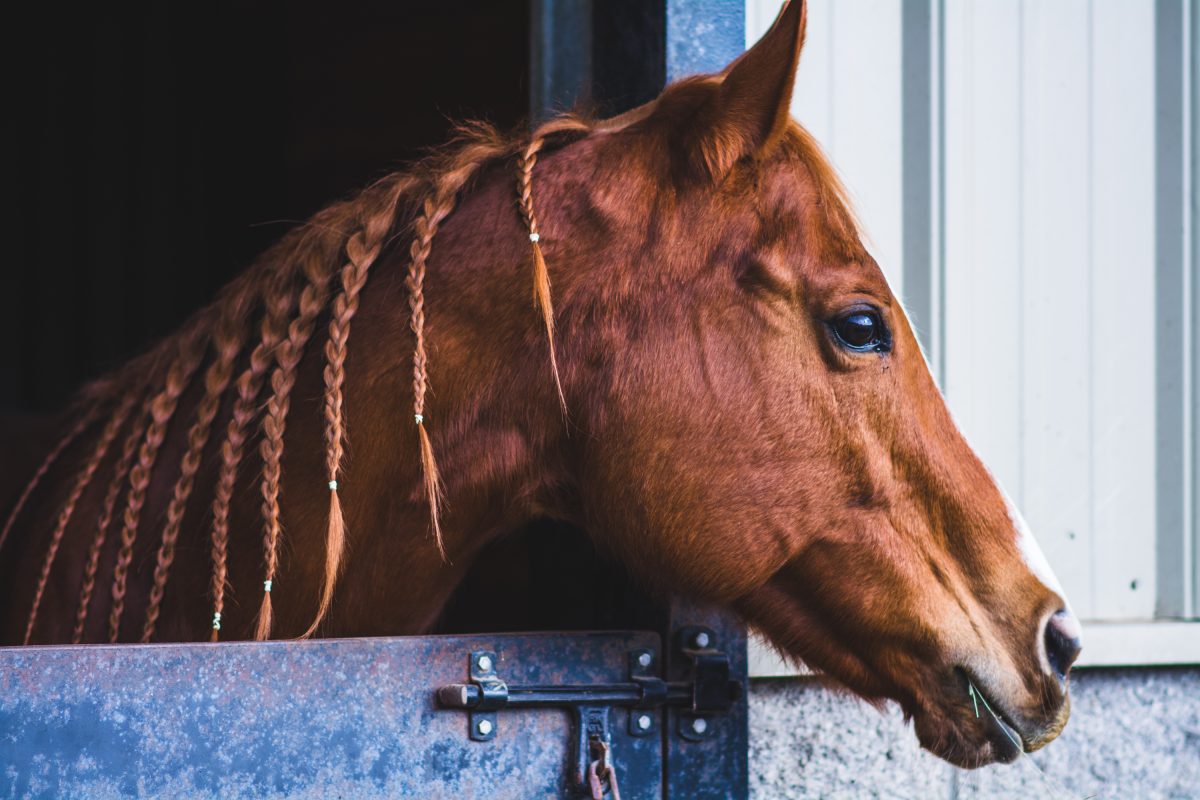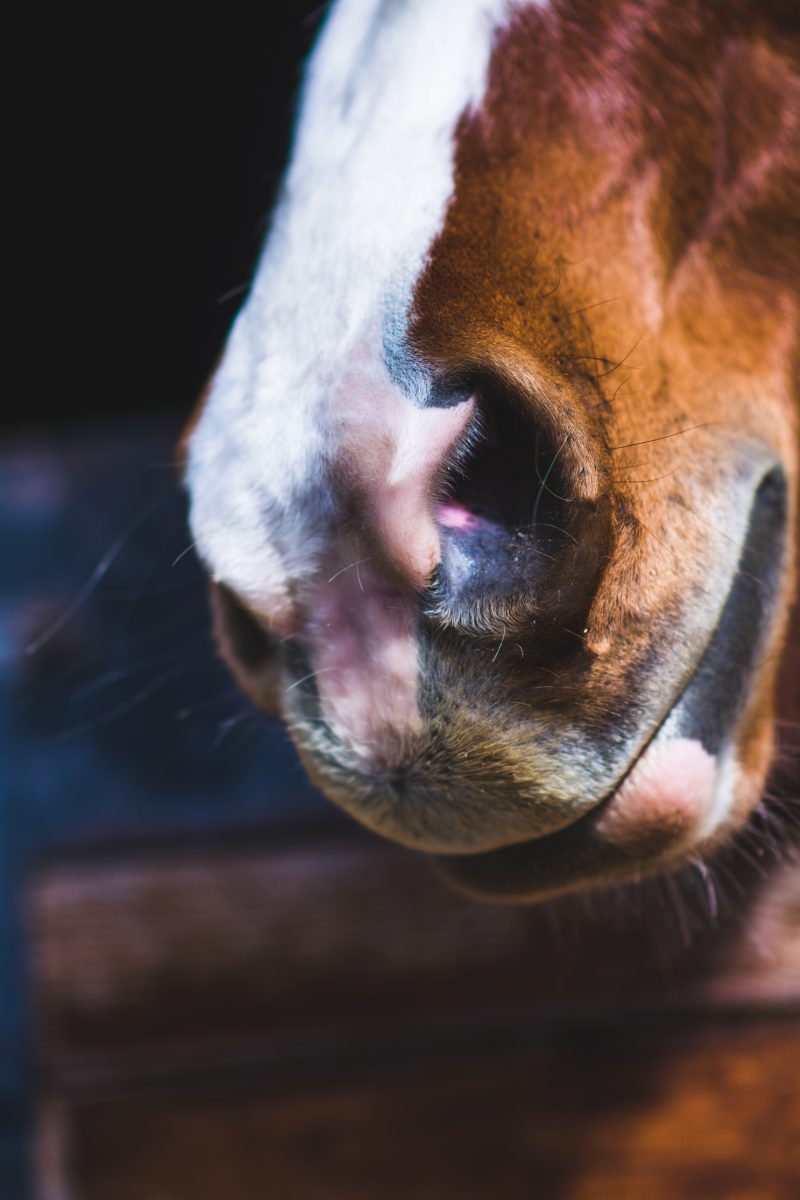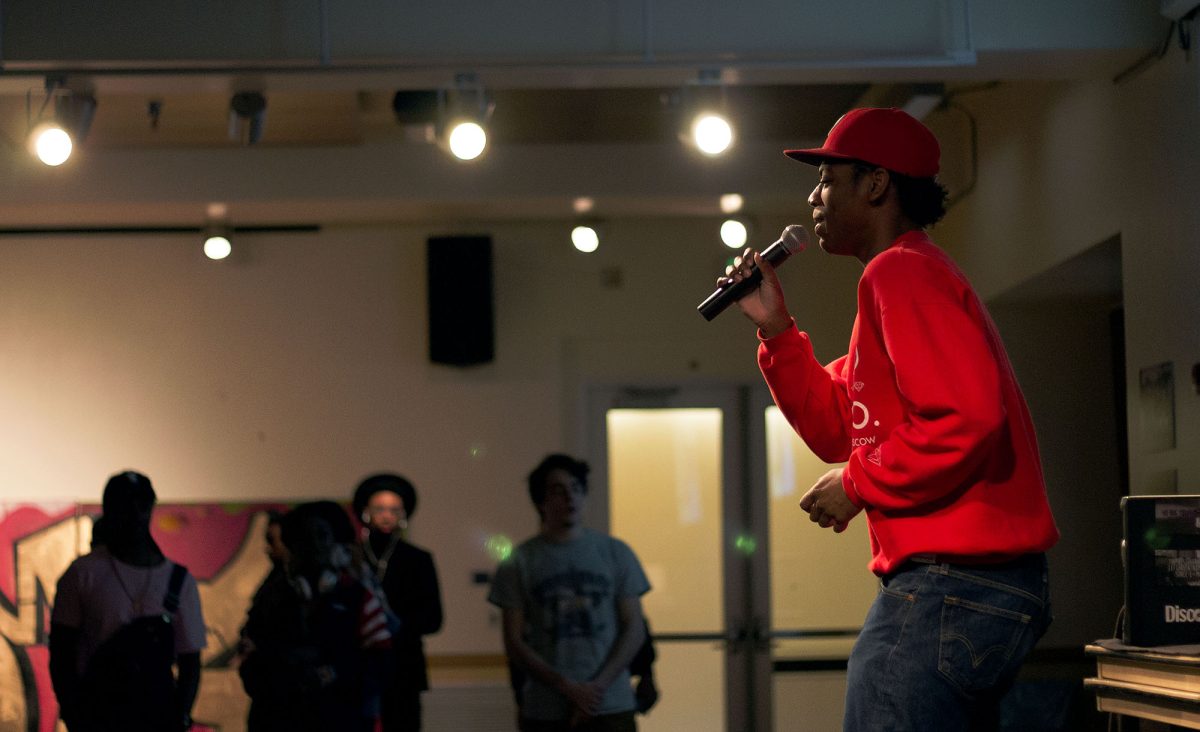Words by Jordyn Brown, Photos by Kjersten Hellis
Early morning light streams through the window of the barn as 18-year-old Skylar Maryott brushes out the mane of a horse named Chica. The horse stands still and content, and the rider brushes her light brown fur, head to tail, with care and precision. His other hand grips the side of his wheelchair, holding him steady.
Maryott has been riding horses for a little over a year now, but he has just recently worked up to being able to tack and groom his own horse at each of his sessions on Fridays. As with all of the students at Eugene’s RideAble, Maryott has found a place where his disability doesn’t hinder his abilities or opportunities to work with horses, and he is able to do something many people would think unusual or even impossible for somebody in a wheelchair. He boasts of obstacle courses he and Chica do, from riding around the barn to leaping over small hurdles. He wheels around the tall animal as light glints off his dark brown hair, peeking from underneath his riding helmet, before he finally saddles up for the barn.
Maryott is one of many over the years who have turned to RideAble as a refuge, a place to challenge themselves in strengthening their riding skills. It’s somewhere that anybody with any sort of special need – whether it be a physical need like Skylar, or more of an emotional need like somebody on the autism spectrum – can come and work through with the help of an animal connection. Students learn to focus on proper riding technique, strengthening their bodies as a sort of physical therapy and the satisfaction of their achievements, which grants them some emotional healing.
However, after 22 years of service to those in the Eugene and Springfield area, RideAble faces an unforeseen and devastating reality: the costs of running a facility as large and demanding as this are astronomical, and unless they are able to make up enough money by the end of the month, they could be shut down for good.
“To see this place close would be heartbreaking,” says Enga Myrand, an employee and volunteer at RideAble for four years now. “You make relationships with the students and the horses and the parents. I love being out on my feet and being with the students, because it makes their day just to be with the horse.”
This would leave members in the community who have turned to RideAble not only without their place of learning, but also it would leave employees without jobs and students without a place to grow physically and emotionally through animal therapy.
“We’ve always struggled financially because people have a hard time understanding this,” says Monica Liles, the owner of RideAble, while gesturing to Skylar riding, slowly leading Chica around barrels in the spacious, hay covered barn. “People think, ‘Oh, isn’t it nice to put people on horses and do pony rides.’ We’re not doing pony rides… For him, he’s got the most freedom in his life that he’s ever had. People don’t get that.”
Without RideAble as an option, the lives of other riding students like Julie Mills would severely shift. Despite being born with a unique birth defect that makes it so all of her joints are frozen, she makes her living by painting and creating art, using the strength of her mouth to guide the tools and paintbrushes. Mills even says she used to pick her son up with her mouth when he was young until he weighed about 60 pounds.
However, she faced more challenges after being the victim of two major accidents where she was badly injured, keeping her in a wheelchair for some time now. The injuries make it impossible for her to even move her neck to paint and draw like she used to. But the impact riding has made on her life is clear.
“Because of my lower back injury, my core became weak, so in 2011, so I started up again,” Mills says. “I went from not being able to walk in my house, to being able to walk again. I just started walking up my ramp every so often. I haven’t been able to walk up my ramp since 2011.” Tears brim heavily in her eyes, even as she smiles. “It’s just a really exciting thing.”
The experiences she has had with the horses have served her in more ways than just physically. In spending so much time with them, she has built relationships with each new horse, and they have come to know her as well.
“The hardest one was Whinney. She’s a prima donna,” Mills says. “At one point I was just really depressed because of my back, my marriage was falling apart because of his addictions and Whinney was giving me a hard time. And I just looked at her and said, ‘I can’t have you being a prima donna right now. I’m really hurting…’ and she put her head against my chest, and let me put my head on her. It was just an incredible thing. She was just holding me. The animals know.”
With a clientele ranging from three to 72 years old, RideAble aims to accommodate people by only charging $35 for hour-long sessions. While this eases the financial strain on potential students and their families, this poses a problem for the business side of RideAble, especially when confronting unanticipated expenses.
“We had a situation where the horses were all poisoned through cobalt so they all became really toxic,” Liles says. “We’re a year into detoxing everyone, and so they’re finally back to being healthy. But that was over $15,000 that cost us. That really put a strain on our finances.”
A GoFundMe set up for the expenses picked up steam, successfully meeting their $15,000 goal that would keep them in business within 10 days, made up of mostly small donations. But according to employee Myrand, it takes about $10,000 a month just to keep the business running what with caring for the horses, paying for the land, employee wages, and more. While it seems RideAble has come out on top of their dilemma this time, it is bound to face similar situations in the future: they have been struggling financially for some time despite holding fundraisers and applying for grants.
But RideAble’s mission has never been about the money. It’s always been about the people, which is why their real long-term need is for more volunteers like Harold Thompson.
“My daughter Hailey, it’s a good outlet for her,” says Thompson, 63. “She doesn’t have a lot of outlets, and it’s a good place for her to be challenged. My daughter is very autistic so to find any place she succeeds at all is great.”
Thompson began volunteering here over a year ago, content to do anything from sweeping the stables to assisting riders in walking their horses around the barn.
“It’s a place for lots of individuals to come together where there aren’t a lot of places for them to go,” Thompson says. “I hear about it and see it, how they benefit physically, mentally and emotionally. It’s the idea of helping a program I believe in, and my own personal connection to it because of my daughter.”
Those at RideAble insist the horses are the real instructors. Each horse has a different attitude, strengths, and needs that help to change the way their students develop. From the Kiger Mustangs to the Appaloosas, the horses seem to make a difference. The folks at RideAble see the progress and power that comes from new sessions, each one changing the lives of a population of people who are often forgotten in the spectrum of their needs.
“This is the one place they come in and they are a person,” Monica Liles says. “They’re not a special needs person or treated like they have special needs. They’re talked to like a real person. And they can’t go anywhere else and ride. Nowhere else is going to do that for them.”
If you would like to help RideAble meet its goal, check out their GoFundMe Page at: GoFundMe.com/gv2bz8bn















